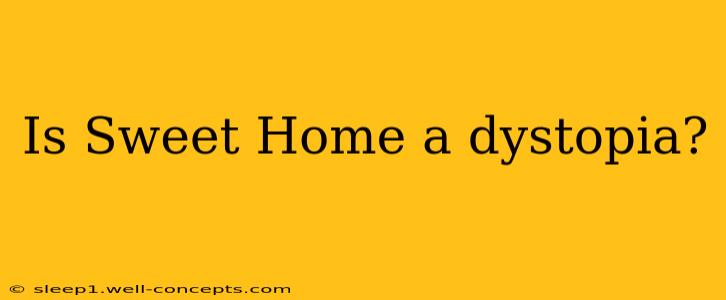The Netflix Korean horror series Sweet Home presents a chillingly realistic depiction of societal collapse, leaving viewers to grapple with its unsettling portrayal of humanity and its potential descent into a dystopian nightmare. While not a classic dystopia in the vein of 1984 or Brave New World, Sweet Home certainly explores many dystopian themes, making the question of its categorization a nuanced one.
The Seeds of Dystopia: Societal Breakdown and Monster Metaphor
The show's dystopian elements are not presented through a totalitarian regime or overt social control, but rather through the insidious breakdown of society itself. The initial catalyst – a mysterious, widespread outbreak transforming humans into monstrous creatures – acts as a potent metaphor for the fragility of social order. As the world outside crumbles, the residents of Green Home apartment building are forced to confront not only the external threats posed by these grotesque monsters but also the internal anxieties and moral compromises born out of survival.
Loss of Order and Security:
Sweet Home vividly illustrates the collapse of established societal structures. The government's absence, the breakdown of law and order, and the widespread panic and chaos paint a stark picture of anarchy. This absence of security forces the survivors to rely on their own wits and create their own makeshift rules, often leading to moral ambiguity and difficult choices. This lack of external governance is a core component of many dystopian narratives.
Dehumanization and Social Darwinism:
The monsters themselves are a reflection of the darkness that can fester within humanity. Their gruesome forms and insatiable hunger symbolize the primal instincts that can take over when societal restraints are removed. The ensuing survival-of-the-fittest dynamic mirrors a dystopian society where compassion and empathy become luxuries few can afford. The brutal reality of the situation pushes individuals to the extremes of their moral boundaries, blurring the lines between victim and perpetrator.
Beyond the Dystopian Label: Exploring Nuances
While many elements of Sweet Home align with dystopian tropes, it's crucial to acknowledge its unique characteristics. The show doesn't portray a meticulously planned oppressive system; instead, it showcases the chaotic and unpredictable consequences of societal collapse. The monsters are not instruments of control but rather a manifestation of the destructive potential within humanity itself.
Humanity's Role in the Dystopia:
Unlike traditional dystopias where a powerful entity imposes its will, Sweet Home places the responsibility for its dystopian landscape squarely on humanity's own shoulders. The monsters are, in a way, a reflection of the internal conflicts and societal ills already present before the outbreak. This makes the series' dystopian aspect more of a consequence than a deliberate creation, shifting the focus from oppressive power structures to the self-destructive tendencies within society.
Hope Amidst the Horror:
Despite the grim setting and terrifying monsters, Sweet Home also features glimmers of hope. The bonds of friendship and the acts of self-sacrifice exhibited by the survivors offer a counterpoint to the prevalent dystopian themes. This resilience in the face of overwhelming odds provides a subtle yet significant departure from the absolute despair often found in traditional dystopian narratives.
Conclusion: A Dystopian Reflection, Not a Dystopia Proper
In conclusion, Sweet Home arguably operates within the broader spectrum of dystopian fiction, using the genre's tropes to explore profound themes of societal fragility, human nature, and the consequences of unchecked fear and desperation. While it doesn't adhere strictly to the conventions of classic dystopian literature, its portrayal of societal collapse, loss of order, and the dehumanizing impact of survival make it a compelling and relevant exploration of what could potentially push humanity towards a dystopian future. The series' power lies in its chillingly realistic depiction of a world spiraling into chaos, a world not entirely dissimilar to our own, albeit amplified by the fantastical element of monstrous transformations.

